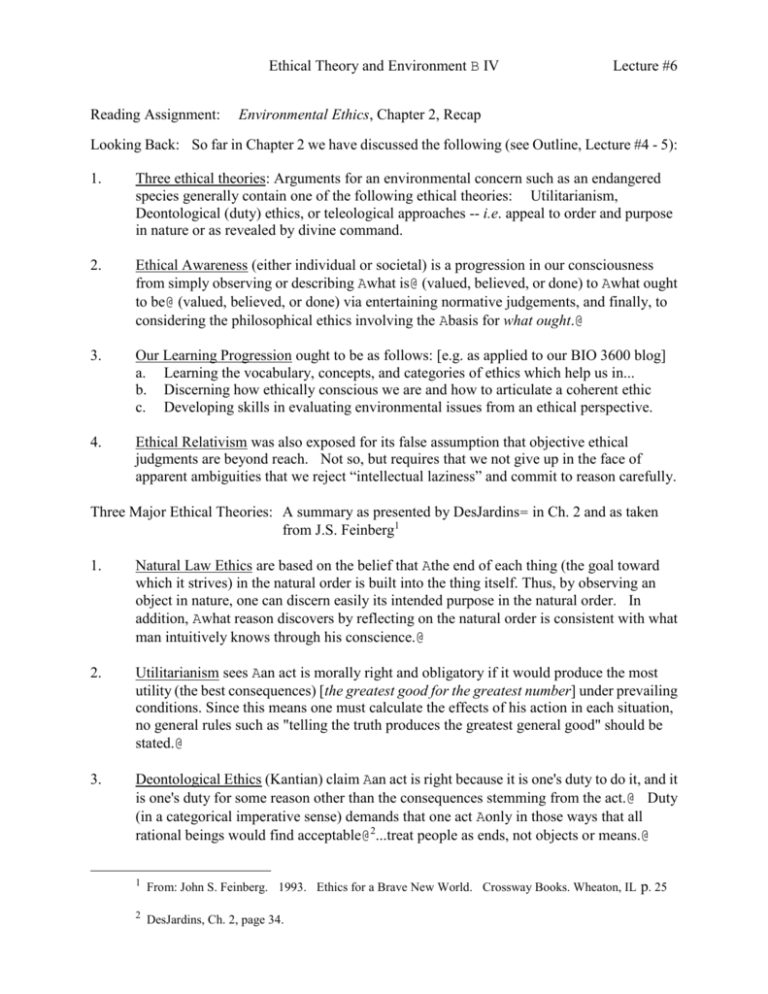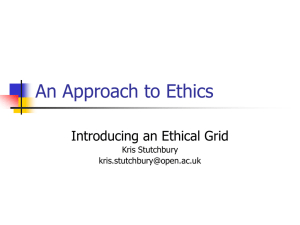Ethical Theory and Environment B IV Lecture #6 Reading
advertisement

Ethical Theory and Environment B IV Reading Assignment: Lecture #6 Environmental Ethics, Chapter 2, Recap Looking Back: So far in Chapter 2 we have discussed the following (see Outline, Lecture #4 - 5): 1. Three ethical theories: Arguments for an environmental concern such as an endangered species generally contain one of the following ethical theories: Utilitarianism, Deontological (duty) ethics, or teleological approaches -- i.e. appeal to order and purpose in nature or as revealed by divine command. 2. Ethical Awareness (either individual or societal) is a progression in our consciousness from simply observing or describing Awhat is@ (valued, believed, or done) to Awhat ought to be@ (valued, believed, or done) via entertaining normative judgements, and finally, to considering the philosophical ethics involving the Abasis for what ought.@ 3. Our Learning Progression ought to be as follows: [e.g. as applied to our BIO 3600 blog] a. Learning the vocabulary, concepts, and categories of ethics which help us in... b. Discerning how ethically conscious we are and how to articulate a coherent ethic c. Developing skills in evaluating environmental issues from an ethical perspective. 4. Ethical Relativism was also exposed for its false assumption that objective ethical judgments are beyond reach. Not so, but requires that we not give up in the face of apparent ambiguities that we reject “intellectual laziness” and commit to reason carefully. Three Major Ethical Theories: A summary as presented by DesJardins= in Ch. 2 and as taken from J.S. Feinberg1 1. Natural Law Ethics are based on the belief that Athe end of each thing (the goal toward which it strives) in the natural order is built into the thing itself. Thus, by observing an object in nature, one can discern easily its intended purpose in the natural order. In addition, Awhat reason discovers by reflecting on the natural order is consistent with what man intuitively knows through his conscience.@ 2. Utilitarianism sees Aan act is morally right and obligatory if it would produce the most utility (the best consequences) [the greatest good for the greatest number] under prevailing conditions. Since this means one must calculate the effects of his action in each situation, no general rules such as "telling the truth produces the greatest general good" should be stated.@ 3. Deontological Ethics (Kantian) claim Aan act is right because it is one's duty to do it, and it is one's duty for some reason other than the consequences stemming from the act.@ Duty (in a categorical imperative sense) demands that one act Aonly in those ways that all rational beings would find acceptable@2...treat people as ends, not objects or means.@ 1 From: John S. Feinberg. 1993. Ethics for a Brave New World. Crossway Books. Wheaton, IL p. 25 2 DesJardins, Ch. 2, page 34. ETHICAL THEORIES GRID Classification and Comparison ENVS 3600 Major ethical theories are systems that attempt to offer normative judgments that define what is right (e.g. thinking, doing, being) or what ought to be. There are differences among them but there are some common features that make them challenging to separate in some respects. Instruction: This exercise is designed to stimulate you to consider, compare, and classify them in a “grid” based upon (a) their criteria for judging “good” or “bad” (e.g. columns), and (b) the source of authority for the ethical norms of each (e.g. rows). Study the following 2 x 2 grid and, based on your understanding, assign each of the following ethical theories to one square within the grid based on the intersecting criteria they represent: Natural Law Ethics - Aristotle Natural Law Ethics - Aquinas Utilitarianism Divine Command Theory Categorical Imperative (Kant) Dominion Mandate (Gen. 1)







